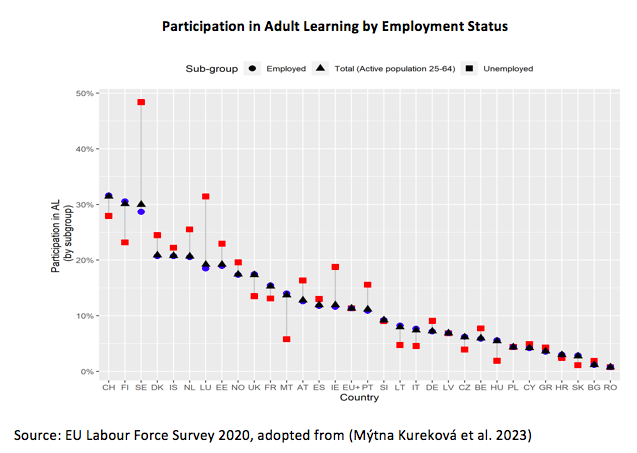In light of the recent development in Europe, the transition towards the green economy gained an even more profound significance. The green transition already resulted in a 32 percent employment growth between 2000 and 2017 in the EU and is further expected to create 24 million green jobs by 2030 globally (ILO, 2018). Cedefop (2021) estimated that the green transition will lead to a change in skills demand and labour market structure as pronounced as the one induced by the technological transformation. The digital transition is inter-twinning with the green transition. While the former is more recognised in terms of skill needs, the latter is more dispersed within the skills spectrum. The INTERCEPT project aims to provide some valuable experiences in this area. Implementing the EU „Fit for 55“ package will even further boost the demand for green and greening skills.
The study of Osborne and Frey (2013) launched a lively discussion on the impact extent to which recent technological advancements impact the occupational structure. The novelty of their approachlayin accounting for advancements in artificial intelligence and robotics emerging ten years ago. They claimed that approximately 47 percent of all jobs in the U.S. is at risk of automation. This estimate launched a lively public debate associated with a stream of studies trying to elaborate on predicting the impact of technologies on occupations. For some occupations, predictions are consistent; for others, expectations change over time. For example, truck drivers were expected to be under a high risk of automation by Frey and Osborne, but are expected to be in high demand by the most recent panel of the World Economic Forum (WEF 2023)[1].
Although the level of uncertainty in predicting future skills demand remains high, existing studies agree that technological change will severely impact the occupational structure in the following years. Approximately one out of four workers is expected to switch jobs, and six in ten workers will need to enhance their skills to retain their current position during the following five years (WEF 2023). Supporting individuals through labour market transitions is recognised among the top priorities of public policies (ILO 2019; European Commission 2019).
Only half of the workers have access to adequate training opportunities (WEF 2023). Participation in adult learning remains associated with substantial barriers, which public policy can at least partially mitigate. This is documented by good examples of countries which managed to enhance access to learning during the unemployment spells of individuals. International differences in the adult learning participation gap between the employed and unemployed show that active labour market policies can successfully operate on this front. Moreover, they also reveal that while some countries managed to enhance learning of the unemployed, other countries are less successful in this respect. While in some countries (e.g. Austria, the Netherlands or Scandinavia), adult learning participation of the unemployed exceeds the AL participation of the employed, in other countries, this pattern twists.
 It is dominantly those countries allocating more resources to active labour market policies, manifesting to be more successful in assisting individuals in their career transitions. Support provided through active labour market policies appears to be effective in increasing access to training and upskilling activities, thus supporting individuals in their labour market transitions. With the increased labour market churn propelled by the introduction of new technologies, the performance of public policies in this area becomes even more critical.
It is dominantly those countries allocating more resources to active labour market policies, manifesting to be more successful in assisting individuals in their career transitions. Support provided through active labour market policies appears to be effective in increasing access to training and upskilling activities, thus supporting individuals in their labour market transitions. With the increased labour market churn propelled by the introduction of new technologies, the performance of public policies in this area becomes even more critical.
Although at the macro-level total job creation is going to compensate for the job destruction, job creation is expected to be more dynamic in the green sector, climate change and environmental management technologies (WEF 2023, European Commission 2021). It is hard to assess occupation-specific risks of automation; nevertheless, we are able to extract the major trends. One of the most pronounced is the growing importance of the green economy (European Commission 2021). According to the results of a survey conducted within the INTERCEPT project (2022), even employers often have a problem grasping the notion of the competencies demanded by the green transition.
The INTERCEPT project addresses future challenges by combining support to individuals during labour market transitions and reskilling for the green economy. It designs a tailored programme addressing the needs of the regional green economy. It also outreaches and mobilises NEETs by raising their environmental awareness to equip them with green-economy-relevant skills acquired in formal training as well as at the workplace. While delivering all these activities, the INTERCEPT project frontlines the employment policies in Lithuania, Malta and the Italian region of Tuscany. In a European comparison, regions which are less successful in supporting individuals through labour market transitions by enhanced access to learning during their unemployment.
Article written by Mgr. Miroslav Stefanik, PhD.(Director, Institute of Economic Research– Slovak Academy of Sciences) for INTERCEPT Project
References:
Cedefop (2021). Digital, greener and more resilient. Insights from Cedefop’s European skills forecast. Luxembourg: Publications Office. http://data.europa.eu/doi/10.2801/154094
European Commission (2019), Directorate-General for Research and Innovation, Future of work, future of society – , Publications Office, 2019, https://data.europa.eu/doi/10.2777/029088
European Commission (2021), Joint Research Centre, Murauskaite-Bull, I., Scapolo, F., Muench, S.et al., The future of jobs is green – , Publications Office, 2021, https://data.europa.eu/doi/10.2760/218792
Frey, C. B., & Osborne, M. A. (2017). The future of employment: How susceptible are jobs to computerisation? Technological Forecasting and Social Change, 114, 254–280. https://doi.org/10.1016/J.TECHFORE.2016.08.019
ILO. (2018). World employment and social outlook 2018: Greening with jobs. International Labour Organisation (ILO).
ILO. (2019). Work for a brighter future – Global Commission on the Future of Work. International Labour Office – Geneva: ILO, 2019 ISBN 978-92-2-132796-7
INTERCEPT. (2022). Key cross-cutting competences related to Green jobs and stakeholders’ perspective. https://interceptproject.eu/wp-content/uploads/2022/09/INTERCEPT_WP4_report.pdf
Mýtna Kureková, L., Lenaerts, K., Studená, I., Štefánik, M., Tobback, I., & Vangeel, N. (2023). Working Paper on the Role of Industrial Relations and Social Dialogue in Improving Adult Learning Outcomes and Equity (pp. 1–49).
World Economic Forum (2023) Future of Jobs Report, Insight Report, May 2023, ISBN-13: 978-2-940631-96-4, Online: https://www.weforum.org/reports/the-future-of-jobs-report-2023/
[1]https://www.weforum.org/reports/the-future-of-jobs-report-2023/


